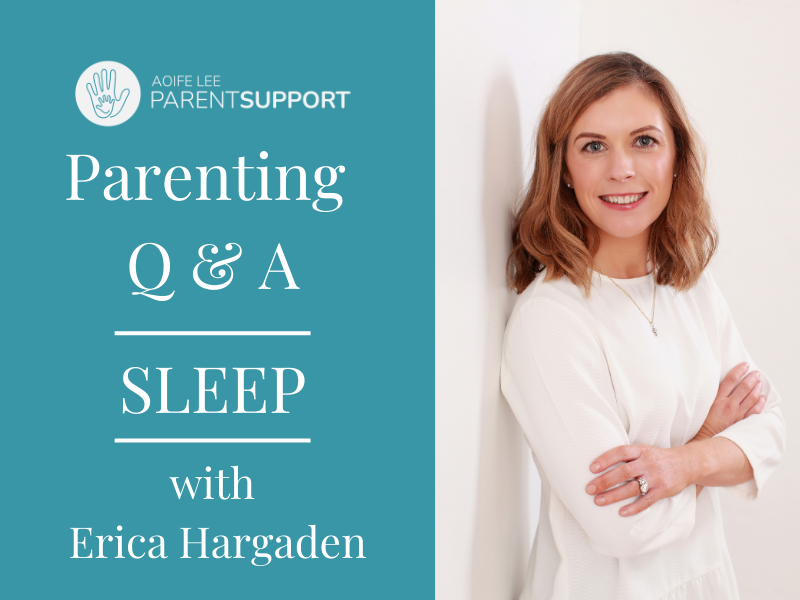Parenting Q&A | How to improve your Toddler's Sleep with Erica Hargaden
We all know what sleep deprivation feels like! Whether you have a brand new baby or a busy toddler, we have all been through those sleepless nights! In an effort to celebrate World Sleep Day on March 19th and to create awareness of what parents or caregivers can do to support their toddler’s sleep , I am thrilled to have caught up with Erica Hargaden of Babogue Sleep Solutions for my Parenting Q & A where we discussed the most common sleep and bedtime challenges for toddlers. From early rising to what is her opinion when it comes to screens before bed and what food to avoid. Other questions that came up were, what to do when our children say they are afraid of the dark and just don’t want us to leave their side as well as how long it can take if you really want to make changes for the better.
Erica is a Mum of 3 and Certified Child Sleep Consultant with her business Babogue. Through her Sleep Series programs she has helped over 2,500 families worldwide achieve the gift of sleep. To find out more check out www.babogue.com or @babogue_sleep on Instagram.
Here is what Erica had to say about some of the most common questions when it comes to sleep and toddlers.
Tips to improve your Toddler’s Sleep
What are the most common challenges when it comes to toddlers and sleep/bedtime?
Early waking and resistance to sleep would be the biggest challenges that I encounter when it comes to toddler sleep. Both can be a huge challenge for parents to resolve.
In terms of early waking the two biggest factors I find influence it are;
1. Overtiredness – In order to combat this make sure that there is supportive balance in napping. Your toddler should nap in the middle of the day and not in the morning time to make up for the early rise. Napping in the morning will actually reinforce the cycle of early waking. Aim for naps to fall around 12.30/1pm for 2 year olds and remember you may need to work towards it if it is not achievable right now.
2. Reinforcement – this is where something is happening at the time of the early wake that reinforces the body’s waking at that time. It could include always being brought into the parents bed, being given a bottle or drink at that time or starting their day and watching TV. This is to name but a few. I rather see parents keep their toddler in their sleep environment until 6am or afterwards and bring them to a brightly lit living space not associated with sleep.
In terms of resistance to sleep the two biggest factors I find influence are;
Sleep Expectations – this is where a toddler has an expectation around their sleep that must happen in order for them to fall asleep. If this expectation is not met then sleep will not be achieved without huge resistance. This could come in the form of parents being expected to stay with their toddler until they fall asleep and or always falling asleep on a bottle. These then need to be repeated throughout their sleep phase in order for sleep to be maintained. By fading these dependencies out toddler parents will get closer to the independent sleep they may desire.
Under or overtiredness – where a toddler is either of these it will make it harder for them to initiate sleep. Keeping an eye on how much day time sleep they have and at what time of the day it falls is important for this age range.
Do screens and certain foods have an impact on bedtime & sleep?
Screens - Absolutely they do. In terms of screens I would advise parents of toddlers to avoid them in the hour prior to bedtime. Blue light is in all devices now, including TVs, and this has a stimulating influence on the brain. Although your child may appear to be ‘relaxed’ in front of the TV it is actually stimulating them in a way that we cannot see. Studies are showing that where these devices are avoided in the hour prior to bedtime deeper more consolidated restorative sleep is achieved.
[Learn more about managing Devices & Screen Time in my recent blog]
Foods that I would advise parents to avoid their children having prior to bedtime would include dairy & those containing high levels of sugar. Both can have a negative impact on sleep due to discomfort and stimulation. Should there be any level of dairy sensitivity even a small amount can derail sleep. I will always recommend that last milk feeds are provided 45-60 mins prior to bedtime so that there is a chance for these feeds to settle with children and to disassociate feeding from sleep.
What are the ideal recommendations for setting a toddler up for a positive sleep routine?
Consistency is key! Toddlers thrive on repetition and knowing what is coming next so by setting up predictable stepping stones to bedtime they will understand and know what is coming. These are key aspects of bedtime routine for toddlers;
After bath time do not return to the living area. Instead go straight to their room and start their bedtime wind down.
Make sure that the room is dimmed down to lamp light so that their body is getting the indication of darkness and their melatonin, the sleepy hormone, production can start to increase.
Lots of children crave 1:1 time with their parents. By including reading time with your child in the 20 mins prior to bedtime you are going to tick that box with them and also add to the development of their language and communication skills.
What are your top 2 sleeping tips?
Top Sleep Tip No 1: children respond well to when the parent tries to gradually move from bedside to outside room.
With gradual retreat methods they need to be very gradual. Remove time lines from the equation and rather think about how you are supporting our toddler in achieving a positive skill – the gift of sleep. Only make a move in the room every 3 days and make that move a small one towards the door. By taking it in small steps rather than big jumps your toddler is less likely to notice the move. Once you are at the door, again, spend at least 3 days there. Spend another 3 days at a minimum outside the door until they fall asleep. And then start the delay and return tactic. Stand outside their room for 2 minutes and then whisper that you are going to check on something – it could be the dinner, it could be the dog, it could be a sibling – but you are going to return in 2 minutes. Do what you say you are going to do, return, but don’t announce your return. Continue this process but each night make the amount of time you spend away from the room longer. Over time you will find your toddler will get comfortable with falling asleep independently knowing that you are checking them and keeping a close parental eye!
Top Sleep Tip No 2: when a toddler says they are afraid.
Between the age of 2 & 3 children can start to express that they are afraid. During these periods I find that being supportive about these big feelings but also empowering them is important. Put together a spray bottle with sparkles inside and call it the Monster Spray bottle – if it is monsters that they are talking about – and with them spray the room free of monsters with them prior to bed. It is also around this age range that you may need to introduce a night light. I advise orange, amber and yellow lights only. Blue and white lights can interfere with sleep phases.
Do you recommend Toddler Clocks?
Toddler & bedtime clocks can be very useful when working on sleep with this age range. In particular where you have an early riser or have just made the move to the big bed. Avoid those that have blue or white lights on them as they can interfere with sleep phases and may pull children from sleep.
How long does it roughly take for a child and parent to adapt to a new approach?
With toddlers it can take longer to adapt to changes around sleep. Giving it up to 4 weeks of consistency will generally see parents in a very different place with their toddler and their sleep dynamics. My Toddler Sleep Series program has proved a great tool to help toddler parents adjust to new sleep approaches with their toddler and also help them resolve sleep challenges they are experiencing.
It was great to catch up with Erica and get some really useful information that I could share with the Parent Support Community to help any parents or caregivers that may be facing challenges with Sleep and their child.
If you are feeling overwhelmed or facing challenges with your children, I am here to help, I offer tailored 1 to 1 parent support sessions. Get in touch with me today at aoife@parentsupport.ie or if you are interested in creating a happier and calmer home I offer a Video Based Positive Parenting eLearning Course.

